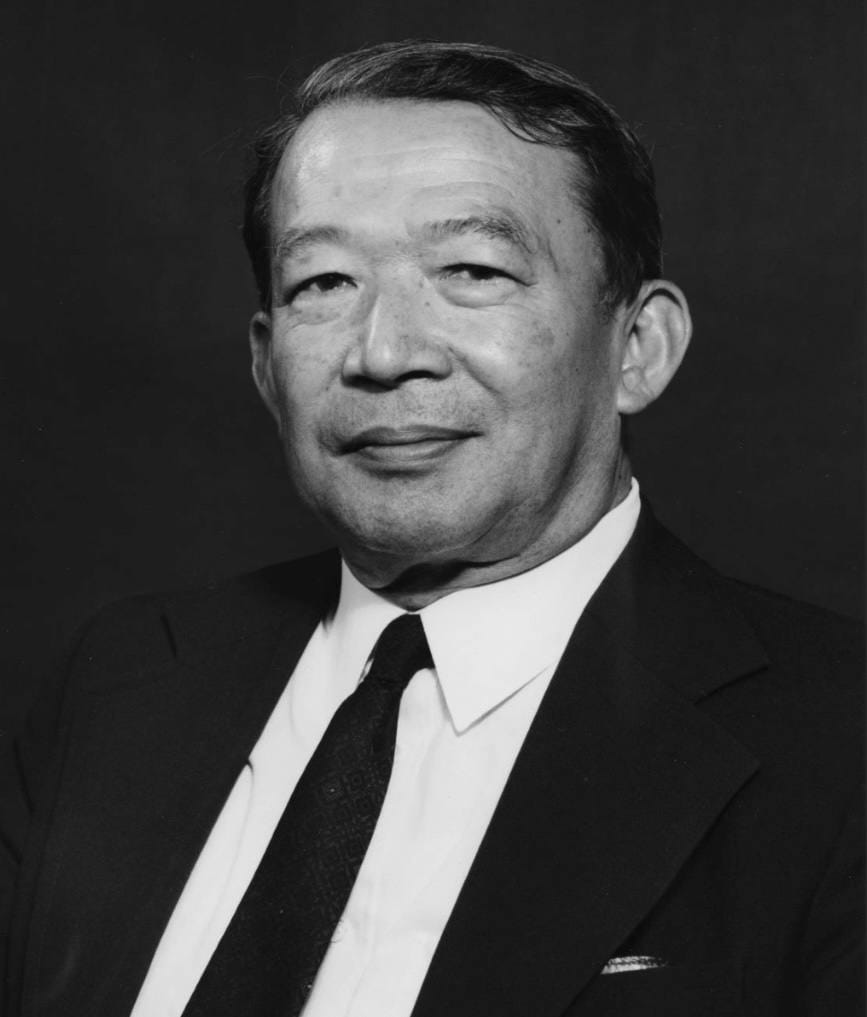
If asked to point out a world-famous scholar in Myanmar's economic history, one would undoubtedly indicate Dr. Hla Myint. When he left the country, he was 41 years old, and he returned to Myanmar at the age of 92. Why did the professor stay abroad for over 50 years?
The story of Professor Dr. Hla Myint might be familiar to those who knew him or were interested in his work, but for today's youth, it might sound unfamiliar. So, we present an introduction to Dr. Hla Myint, the world-renowned Myanmar economist. This article is an introduction to the professor, so it won't detail his academic achievements, and we must admit that doing so would not be easy.
Professor Dr. Hla Myint was born in Pathein, Ayeyarwady Region, in 1920. At the age of 14, in 1934, he entered Rangoon University. At that time, Rangoon University typically admitted students at age 15, but due to his exceptional abilities, Dr. Hla Myint was allowed to enroll at 14.
At Rangoon University, he studied under the economist Harold Bernardelli. Bernardelli was a famous Jewish economist who had been expelled by the Nazis. Bernardelli greatly influenced Dr. Hla Myint and taught him economic concepts.
Dr. Hla Myint received a scholarship from Dr. Ba Maw's government before World War II and studied at the London School of Economics. There, Dr. Hla Myint's thesis was supervised by the renowned economist Friedrich Hayek. Professor Dr. Hla Myint greatly admired Hayek as a true liberal. Dr. Hla Myint earned his Ph.D. in Economics from the London School of Economics.
First Return to the Country
After World War II, in 1946, Professor Dr. Hla Myint became a Professor of Economics at Rangoon University. This return to Myanmar and professorship was voluntary; he did not accept any salary or compensation. Thus, he worked to improve the economics department under the dilapidated buildings of Rangoon University. He was only 26 years old at the time. Professor Hla Myint invited Professor Thein Wai, who had earned a Ph.D. in Economics from Yale University, to join him at Rangoon University. Another was the economist Professor Sundrum.
Professor Dr. Hla Myint, Professor Thein Wai, and Professor Sundrum are remembered by later generations as the three pillars who breathed life into the Economics Department of Rangoon University. Dr. Hla Myint became an economic advisor in 1947 and participated in drafting the Sorrento Villa two-year plan for national economic reconstruction led by General Aung San.
In 1948, Myanmar gained independence. Professor Dr. Hla Myint became the economic advisor to Prime Minister U Nu. However, he did not enjoy his advisory role as much as his earlier university life.
Working as an academic at the university didn't require considering politics. But being the Prime Minister's economic advisor meant giving advice with half a brain for politics and half for economics. Dr. Hla Myint couldn't manage this type of role.
Prime Minister U Nu began implementing a state-led economic system to boost the nation's economy. This state-led economic system didn't align with Professor Dr. Hla Myint's economic beliefs.
By 1953, Prime Minister U Nu became focused on large-scale construction projects proposed by American economist Robert Nathan and others. Domestically, this plan was called the Pyidawtha Plan. Professor Dr. Hla Myint didn't believe the Pyidawtha Plan would succeed, and later events proved him right.
Another issue was the Crop Purchase and Sale Board. This board set domestic rice prices. The government bought rice at this set price and then exported it. The difference between the set price and the world market price was taken as profit by the state. The profit was then used for the benefit of the country.
However, corruption among AFPFL government members in this system grew, and it didn't benefit the country as much as expected. By 1950, Professor Dr. Hla Myint mainly highlighted two points due to government policy errors, wastage in crop purchases and sales, and corruption. These were: to abolish the Crop Purchase and Sale Board, and to re-accept private and foreign investments.
But Prime Minister U Nu's government was the first-generation independence government that had fought off colonial Britain. They deeply hated the colonial system and the fact that indigenous people had become third-class citizens behind the Chinese and Indians due to the colonial economy. So, the strongly nationalist government viewed Dr. Hla Myint's economic policy as similar to colonial-era economic policy. In reality, Professor Dr. Hla Myint's policy was a free market economic policy.
If they had been able to implement a market economic system at that time, Myanmar's economy might have turned out differently. Unfortunately, the government rejected Professor Dr. Hla Myint's proposals.
Due to these disagreements, around 1950, Professor Dr. Hla Myint returned to England to teach at Oxford.
Second Return to the Country
Eight years later, in 1958, when Prime Minister U Nu's government transferred power to General Ne Win, forming a caretaker government, Professor Dr. Hla Myint returned to Myanmar. No longer a government advisor, he worked as a professor at Rangoon University until 1961. This period was marked by protests, public uprisings, and economic hardships. Later, Dr. Hla Myint left for Oxford.
In 1962, General Ne Win seized power in the country. Misfortunes befell the nation as General Ne Win expelled Chinese, Indian, and Western nationals. When famous figures from Rangoon University like J.S. Furnivall and history professor Gordon Luce were accused of being CIA spies, Dr. Hla Myint became disillusioned and decided not to return to a country that didn't value its scholars.
The professor continued as a lecturer at Oxford until 1965. In that same year, 1965, the London School of Economics appointed Dr. Hla Myint as a professor. While teaching there, he became an honorary professor at the London School of Economics in 1985. In 1993, he retired from academia. After that, he also worked as an advisor to the World Bank.
Through his papers and books, the professor advocated for using a free and open economic system for national economic development, opening up closed systems, welcoming foreign investment, creating an environment conducive to business rather than offering tax breaks to attract investment, and welcoming labor-intensive industries.
South Korea and Taiwan, which accepted Dr. Hla Myint's economic ideas, became Asian Tiger economies. Some Southeast Asian countries also adopted Dr. Hla Myint's export-oriented policy and developed. However, Myanmar, which gave birth to this classic economist, remained stagnant.
But Dr. Hla Myint didn't give up on his homeland. Myanmar began to see political changes in 2010. After that, people gained the opportunity to participate in public policy. In July 2013, when the parliament planned to enact the Farmers' Rights and Protection Law, Dr. Hla Myint published a paper in the Myanmar Alin newspaper on July 12, 2013, warning of the dangers of this law, using Thailand as an example. This was Dr. Hla Myint's first participation in a public policy debate.
In 2017, Professor Dr. Hla Myint passed away. Although the professor is gone, among the new generation of young scholars, Dr. Hla Myint remains a name to aspire to, and in the international academic field, his theories and academic papers continue to shine brightly.
Read More:
 Build Myanmar - MediaY3A
Build Myanmar - MediaY3A
 Build Myanmar - MediaY3A
Build Myanmar - MediaY3A
Build Myanmar-Media: Insights – Empowering Myanmar Youth, Culture, and Innovation
Build Myanmar-Media Insights brings you in-depth articles that cover the intersection of Myanmar’s rich culture, youth empowerment, and the latest developments in technology and business. Stay informed and inspired as we rebuild Myanmar through knowledge and innovation.
📅 New content every week, featuring stories that connect Myanmar’s heritage with its future.
📰 Read on:
- Website: https://www.buildmyanmarmedia.com/
- Facebook: https://www.facebook.com/buildmyanmar
- YouTube: https://youtube.com/@buildmyanmarmedia
- Telegram: https://t.me/+6_0G6CLwrwMwZTIx
- Inquiry: info@buildmyanmar.org
#BuildMyanmararticles #Myanmararticles #MyanmarUpdates #MyanmarNews #BuildMyanmarMedia #MyanmarHeritage #Insights #Media #MyanmarMedia
Sign up for Build Myanmar - Media
Myanmar's leading Media Brand focusing on rebuilding Myanmar. We cover emerging tech, youth development and market insights.
No spam. Unsubscribe anytime.
